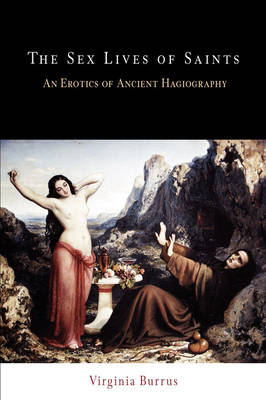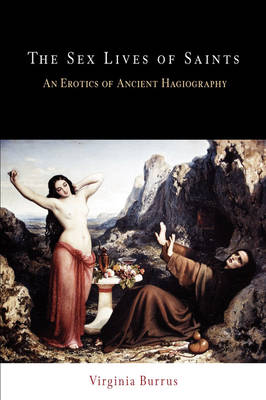
- Afhalen na 1 uur in een winkel met voorraad
- Gratis thuislevering in België vanaf € 30
- Ruim aanbod met 7 miljoen producten
- Afhalen na 1 uur in een winkel met voorraad
- Gratis thuislevering in België vanaf € 30
- Ruim aanbod met 7 miljoen producten
Zoeken
Omschrijving
"Brilliant and important. . . . From page one she challenges approaches to hagiography that dismiss ascetic desire as the sublimation of sexuality and a pathological hatred of the body."--Theological Studies "Countering the assumption that ascetics repress, sublimate, or even eradicate sexual desire, this fine book detects a vibrant eroticism in tales of fourth- and fifth-century saints. Rather than read ancient saints' lives as anti-erotic, or, worse, an-erotic, Burrus reveals a flourishing ars erotica. . . . A deft reading of the interplay between gender and erotics in ancient saints' lives."--Journal of Religion "Those familiar with Burrus's previous work will know that she is expertly informed in feminist theory and theories of gender: here she has expanded her purview to include a wide range of contemporary philosophical writings on desire. . . . Burrus's interweaving of ancient and modern voices is as meditative as it is analytical, but the overall effect is to induce the reader into an alternative view of what constitutes the allure of the saintly life. . . . After The Sex Lives of Saints hagiography will never be the same."--Journal of Early Christian Studies Has a repressive morality been the primary contribution of Christianity to the history of sexuality? The ascetic concerns that pervade ancient Christian texts would seem to support such a common assumption. Focusing on hagiographical literature, Virginia Burrus pursues a fresh path of interpretation, arguing that the early accounts of the lives of saints are not anti-erotic but rather convey a sublimely transgressive "counter-eroticism" that resists the marital, procreative ethic of sexuality found in other strands of Christian tradition. Without reducing the erotics of ancient hagiography to a single formula, The Sex Lives of Saints frames the broad historical, theological, and theoretical issues at stake in such a revisionist interpretation of ascetic eroticism, with particular reference to the work of Michel Foucault and Georges Bataille, David Halperin and Geoffrey Harpham, Leo Bersani and Jean Baudrillard. Burrus subsequently proceeds through close, performative readings of the earliest Lives of Saints, mostly dating to the late fourth and early fifth centuries--Jerome's Lives of Paul, Malchus, Hilarion, and Paula; Gregory of Nyssa's Life of Macrina; Augustine's portrait of Monica; Sulpicius Severus's Life of Martin; and the slightly later Lives of so-called harlot saints. Queer, s/m, and postcolonial theories are among the contemporary discourses that prove intriguingly resonant with an ancient art of "saintly" loving that remains, in Burrus's reading, promisingly mobile, diverse, and open-ended. The Sex Lives of Saints not only offers new readings of both sex and sanctity but also provides innovative insights for ongoing feminist discussions of gender, moving beyond questions about women's social roles to consideration of the gendered subjectivities constructed and deconstructed within the erotic economies of ancient hagiographical literature. Virginia Burrus is Professor of Early Church History at Drew University and the author of Saving Shame: Martyrs, Saints, and Other Abject Subjects, also available from the University of Pennsylvania Press.
Specificaties
Betrokkenen
- Auteur(s):
- Uitgeverij:
Inhoud
- Aantal bladzijden:
- 224
- Taal:
- Engels
- Reeks:
Eigenschappen
- Productcode (EAN):
- 9780812220209
- Verschijningsdatum:
- 29/10/2007
- Uitvoering:
- Paperback
- Formaat:
- Trade paperback (VS)
- Afmetingen:
- 152 mm x 229 mm
- Gewicht:
- 335 g

Alleen bij Standaard Boekhandel
+ 103 punten op je klantenkaart van Standaard Boekhandel
Beoordelingen
We publiceren alleen reviews die voldoen aan de voorwaarden voor reviews. Bekijk onze voorwaarden voor reviews.











